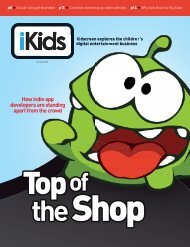Inside - Kidscreen
Inside - Kidscreen
Inside - Kidscreen
Create successful ePaper yourself
Turn your PDF publications into a flip-book with our unique Google optimized e-Paper software.
consumer sumer<br />
products<br />
Wolverine’s Canadian<br />
heritage certainly<br />
enhances his appeal<br />
with that country’s<br />
consumers<br />
22 July/August 2011<br />
North<br />
facing<br />
Marvel fi nds Canada-specifi c<br />
CP program paying off with<br />
double-digit sales gains<br />
B<br />
BY GARY RUSAK<br />
lue-chip licensor Marvel has developed a unique vision of the North American<br />
soft-goods market that is paying dividends north of the 49th parallel.<br />
“The strategy is to make sure we are treating Canada as a separate territory<br />
in and of itself,” says Paul Gitter, president of consumer products for North<br />
America at the Disney-owned company. “What we did in the past was combine<br />
Canada with the US. But we found that the US licensees didn’t pay enough attention<br />
to the Canadian market.” (According to industry org LIMA, the Canadian<br />
licensed consumer products market is currently valued at roughly US$8.4 billion in retail.)<br />
Two years ago, Marvel started to take a new approach and identifi ed Canadian manufacturers<br />
and possible licensees who possess specifi c expertise in the Canadian retail and consumer<br />
landscape. And owing to manufacturing realities that hardlines are more effi ciently produced in<br />
Asia, the approach is restricted to softline categories, which aren’t insignifi cant in terms of sales.<br />
Marvel’s Canada-specifi c licensees currently include Black and White (footwear), Montec (bedding)<br />
and Coledo (back-to-school), and Gitter says the company plans to keep adding to the list.<br />
As the Canadian economy continues to outpace its neighbor to the south, Gitter says that it<br />
has become imperative to deal with licensees who have connections to the country’s growing retail<br />
base. “So much is changing,” he says, referencing the recent announcement of mass-market<br />
giant Target’s plans to open more than 100 Canadian locations over the next 24 months.<br />
“We need people that understand the retail dynamic,” Gitter says. “Canadian companies<br />
prevail because their focus is 100% on the Canadian market.”<br />
The company handles all deals out of the US and deploys a small team into the marketplace<br />
on a regular basis to work with retailers and licensees.<br />
And Gitter says a similar strategy is being employed in markets around the globe that resemble<br />
Canada’s, including separating programs that in the past have fallen under European<br />
umbrella deals and developing diff erent approaches tailored to meet the country-specifi c needs<br />
of next-door neighbors Australia and New Zealand.<br />
“Anytime we can localize and better service the community with local affi liates and local<br />
manufacturers, traditionally we see sales increase,” Gitter contends. In fact, he says Canadian<br />
sales have shot up by 20% since the program began.<br />
The logical extension of the concept is to specialize even further, perhaps at a micro level.<br />
And Marvel has in fact gone down that road with a New York-specifi c program. “We are even<br />
doing it at the State and city level,” says Gitter. “We partnered with the NYPD and NYFD to<br />
co-brand shirts with Spider-Man.” The New York program began in July, and Marvel confi rms<br />
that other key cities are being evaluated for similar campaigns.
















